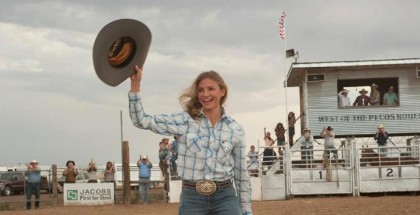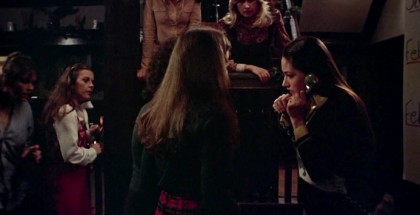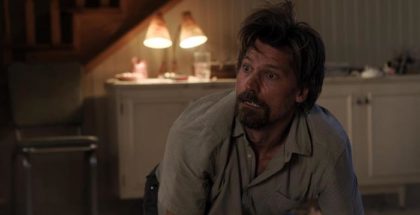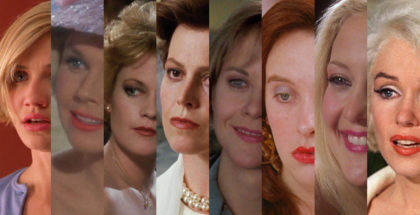Why The Good Fight should be your next box set
Review Overview
Cast
9Characters
9Context
9David Farnor | On 10, Mar 2018
“The only constant we have is the law,” says Adrian Boseman (Delroy Lindo) in the of The Good Wife’s first season. It’s exactly the kind of declaration you expect to hear in a slick legal drama, and The Good Fight doesn’t shy away from ticking all the boxes of the genre. But it ticks them with such style, confidence and class that it’s impossible not to be hooked.
The show, of course, is a spin-off from The Good Wife, ordered by CBS to launch its subscription streaming service, CBS All Access. But it’s testament to how good the writing by creators Robert and Michelle King is that The Good Fight never feels like a sidekick or a companion piece, but a courtroom heavyweight in its own right – while it’s designed to woo fans of the original, you can tune into this without having seen any of The Good Wife and still be utterly gripped.
We pick events up one year after The Good Wife’s final episode, with Christine Baranski reprising her role as Diane Lockhart. Planning to retire, she instead finds herself the victim of financial fraud, leaving her stranded between the law firm where she was guiding a young mentee – her goddaughter, Maia (Rose Leslie) – and, well, the door.
It’s a fantastic starting point for the new programme, one that brings with it all the catty competition and veteran experience of The Good Wife’s seven runs. That’s largely due to Baranski herself, who is lip-smackingly tart as Diane, all sharp teeth and no sympathy (she spits out a carefully chosen swear word before the gorgeous opening credits) – until she’s conned by Henry (Paul Guilfoyle), opening up a gaping, vulnerable wound that, in the cutthroat world of Chicago law, nobody rushes to help close. It’s an equally bruising blow to Maia, and Rose “You know nothing Jon Snow” Leslie expertly steps out of Game of Thrones’ shadow to deliver a winning performance as the young go-getter who’s already more of an underdog than convention would normally dictate.
Our central duo are surrounded by an impeccable ensemble, led by Cush Jumbo as Lucca Quinn, also jumping over from The Good Wife. She’s given much more to do here, and sinks her teeth into the role. As a third year associate, she gets the lion’s share of the court action, either flying solo or as second to Diane, and also gets a romantic subplot to boot, as she begins a sparky relationship with Colin (Justin Bartha in sleaze-ball mode), a lawyer for the US Attorney, which makes him both a rival and a potentially useful ally. There’s huge fun, too, from Erica Tazel as Barbara Kolstad, one of the partners in Reddick, Boseman & Kolstad, who hates Diane’s guts but slowly begins to reconcile with her, as Boseman forces them to work together.
But best of all, perhaps, is Lindo, an actor who’s been crying out for this kind of character for years – an excuse to see him in top flight in your living room every single week. His company boss is fair, kind, encouraging and supportive – he pushes Maia to be more assertive and is patient with Diane, as she tries to get funds from her old firm to make a capital contribution to her new employees. But cross Adrian and he takes no prisoners, standing up to judges, calling out foolery when he sees it and never missing the chance for a fiery speech in defence of his colleagues. When Lucca becomes the target of a bureaucratic ploy, Lindo unleashes a tide of anger that’s never overplayed – just like his commercial savvy, as he tries to move the company into the entertainment business, he’s a canny presence that steals scenes in the most generous way possible.
Reddick, Boseman, & Kolstad’s background, we learn, is in police brutality cases, holding the Illinois boys in blue to account. The company’s status as an African-American-run law firm makes them a target for the authorities, and the writers use that as a way to rack up some highly pertinent issues. Matthew Perry is on enjoyably foul form as Mike Kresteva, a lawyer for the US Department of Justice who will stop at nothing to thwart the firm’s police brutality work. Hiring Elsbeth Tascioni (Carrie Preston), a wonderfully quirky but equally ruthless lawyer, is their response. Elsewhere, the company finds itself up against chauvinist judges (Jerry Adler), a neocon blogger (played with side-splitting relish by John Cameron Mitchell), the grey area surrounding doctors helping potential terrorists from dying over Skype, and an online hack, involving a guest appearance from Jason Biggs as a Bernie bro keen to make change.
The legalities of trolling and social media management, in particular, is given an added edge by their relevance to Maia’s life, as she ends up tied to the financial shenanigans that hurt Diane (and a horrible online hate campaign). Her father, Henry (Paul Guilfoyle), is a slippery customer looking to go down for a Ponzi scheme, only outdone by the manoeuvrings of her uncle Jax. Both are contrasted by the brilliant Bernadette Peters as her mother, Lenore. Lucca isn’t the only one facing potential charges, and the question of whether Maia could end up in jail hangs over the whole series, even when we find out the truth about who was behind the dodgy dealings.
It’s a bittersweet touch that only adds to the satisfaction of seeing Maia find her feet, and her voice, both professionally and personally. Her rise is matched nearly by Marissa (Sarah Steele), who wangles her way into the position of Diane’s assistant – “Hire me for one day until you find someone better. And I promise you won’t find someone better.” – and finds she has a knack for investigating cases.
In other shows, Marissa would just be the comic relief, but it’s typical of The Good Fight that she’s more rounded than that; this is a series that takes time to give each character space to grow and change. Julius (Michael Boatman), for example, has an entire arc around his sense of identity and belonging, after we learn that he voted for Trump – something that becomes both a pro and a con with every new case. Indeed, the whole show unfolds against the background of America’s shifting political landscape (despite the fact that this was written before Trump took office), a world that makes the firm’s work all the more vital – and sets the stage for a David and Goliath-style struggle between the wealthy and the not. The result is a winning blend of soap operatics and precise storytelling, one that taps into modern concerns of morality, moderation, compromise and money. It climaxes in a quiet chat between Adrian and Barbara, as a blackout leaves them in the dark, only seeing by the tiny lights from their smartphones and other devices. That kind of symbolism might sound heavy-handed, but The Good Fight plays things low-key throughout, as it manages the impossible feat of living up to – and perhaps even surpassing – The Good Wife, with its expanded characters, cracking (and diverse) cast and timely plotting. In an age of post-truth, this is a winning drama about people fighting to keep the line between right and wrong clear. All we have is the law, remarks Adrian. Once you’ve binged through all 10 parts of Season 1, you’ll be desperate to sue anyone so you can watch one more episode.
The Good Fight: Season 1 to 3 is available to watch online on Amazon Prime Video as part of a Prime membership or a £5.99 monthly subscription.























